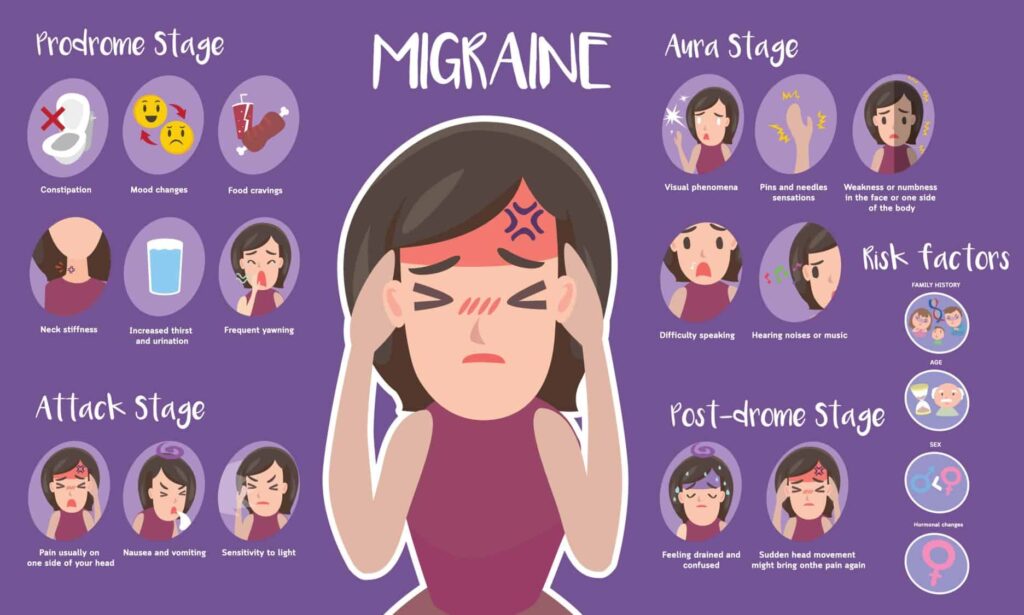In the U.S., more than thirty-eight million people suffer from migraines.
More than a headache, migraine is a condition characterized by a variety of symptoms beyond intense headaches. These include vomiting, nausea, sensitivity to sound and light, and difficulty speaking.
Migraines can affect people of all ages. However, they are seen most often in people aged 35 to 55.
Diagnosis Of Migraines
Migraines are diagnosed by reporting a patient’s symptoms and their clinical history. Women have greater chances of developing migraines than men. However, family history plays an important role as well.
Symptoms Of Migraines
Patients may experience migraine symptoms a day or two before they actually get the headache. This is referred to as the prodrome stage and may manifest in these symptoms:
- Excessive food cravings
- Depression or anxiety
- Fatigue
- Irritability
- Repeated yawning
- Stiffness in the neck
In migraines with auras—flashing or zigzag lines in vision—you may experience these symptoms:
- Difficulty in speech
- Tingling sensations in the arms, legs, or face
- Temporary loss in vision
- Bright spots and light flashes in vision
When the migraine pain actually occurs after the prodrome period, patients experience acute throbbing pain at one side of their heads that can last from several hours to days.

While migraine symptoms may vary in different people, a few common symptoms include:
- Heightened sensitivity to sound or light
- Nausea and vomiting
- Fatigue
- Dizziness
- Pulsating pain experienced on a particular side of the head
- Wanting to stay in a dark room
After the migraine pain subsides, patients may experience mood swings and extreme fatigue. Moreover, some patients may experience a persistent dull headache.
Treatment for Migraines
Consult your doctor for effective management of migraine pain and other symptoms. Your healthcare provider will work with you to develop a treatment plan to treat your migraine symptoms.
The treatment plan depends on:
- Your age
- The frequency of your migraines
- The type and severity of your migraine
- Your medical history
Based on the aforementioned factors, your healthcare provider may suggest these treatment strategies for managing your migraines:
- Migraine remedies involving self-care
- Stress management through yoga or other exercises
- Ways to avoid migraine triggers
- Over-the-counter drugs for migraine management, such as non-steroidal anti-inflammatory drugs (NSAIDs).
- Medications to manage vomiting and nausea
- Counseling
- Alternative care, including acupuncture or acupressure, meditation, etc.
Remedies for Migraines
While having a migraine attack, you can try these remedies for pain management:
- Resting in a dark room
- Drinking plenty of water, as, according to studies, migraines may occur due to excessive dehydration.
- Massaging your neck or forehead with an ice-filled bag can help in alleviating migraines
We can help in managing your migraine symptoms.
Stripes Urgent Care offers urgent care services in Gold Canyon, AZ. You can reach out to us to make an appointment and get in touch with one of our doctors so they may get started with your case.
